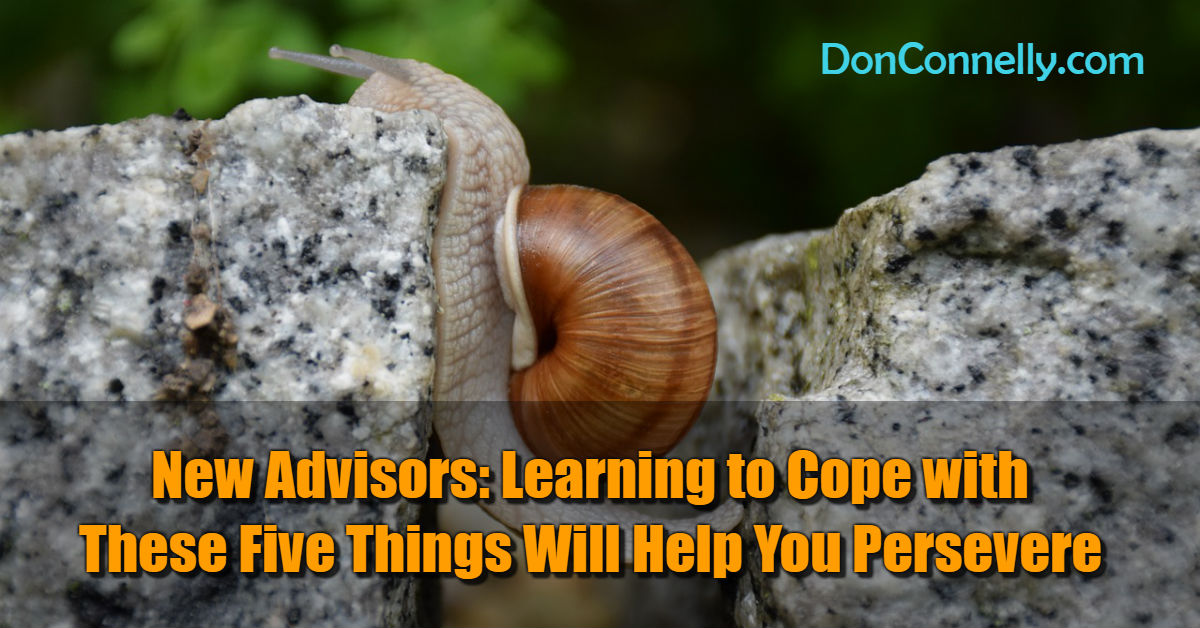New Advisors: Learning to Cope with These Five Things Will Help You Persevere
 Outstanding advisors possess sustainability; they have the ability to overcome mental and emotional obstacles in a way that average advisors can’t. Simply passing the relevant exams won’t help you develop these coping skills – they don’t get taught in training. So, if you too want to reach the top of your profession, you’ll need to develop a tough mindset and overcome difficulties that others cannot.
Outstanding advisors possess sustainability; they have the ability to overcome mental and emotional obstacles in a way that average advisors can’t. Simply passing the relevant exams won’t help you develop these coping skills – they don’t get taught in training. So, if you too want to reach the top of your profession, you’ll need to develop a tough mindset and overcome difficulties that others cannot.
Here are five things you’ll frequently encounter in your practice that you need to cope with to stay the course.
1. Learn to cope with fear of rejection
The fear of rejection is an inherent human condition. When we’re told ‘no’ by a prospect this often translates to being personally rejected as a person. Prospecting means interrupting another person’s life and introducing the significant risk of being rejected (which is why three in four advisors dread prospecting).
But if you want to build a creditable business you need to interrupt people – a lot. And while you can’t control what prospects will say or do, you can control your actions and activity level.
To help you cope with the fear of prospecting understand that you have something incredibly valuable to offer. If a client doesn’t purchase your services then he or she’s going to be leaving their future financial security on the table.
To help you face your fear of rejection actively seek it out. Choose a day to say hello to every stranger you meet – at the mall, at the coffee shop and even on the street. You’ll be pleasantly surprised at how many people respond positively.
You could also try getting rejected by asking for things you don’t expect to get. If you got two fortune cookies with your Chinese meal ask for four. At the car wash ask if they’ll throw in a complimentary air freshener. Ask for an upgrade when you check in at your hotel.
Yes, you may well get rejected. But the more times you do this, the more you’ll realize it’s not so bad. You may end up with some great ‘freebies’ – and if you don’t, what have you lost? With a few ‘yeses’ notched up you’ll realize that there are more opportunities out there than you thought.
2. Learn to cope with asking for referrals
Asking for referrals is like admitting your business is lacking and needs help. But if you want your business to improve, asking for referrals is something you need to do on a regular basis.
To help you cope with this difficult situation ask yourself if you feel that you truly added value to a client’s life. If you have, then surely their friends and family should benefit from your advice too.
Ask your clients if they’re happy with your service and what you do for them. If they say yes, then ask them if they know of anyone who may be missing out on your valuable advice – if there’s someone they know who’s been neglecting their financial affairs, they need to get them on the phone – pronto.
3. Learn to cope with apathy
Apathy is the step before burnout and if happens to you, it may very well mean that you aren’t enjoying what you do anymore.
To help you overcome apathy, take a step back and ask yourself why you became a financial advisor in the first place. Was it because you wanted to help people improve their lives? Did you once see someone close struggle financially? Get up every morning remembering that you alone are responsible for the choice you made to become a Financial Advisor. Accept this is your area of expertise – your big opportunity to make a difference in other people’s lives. Become your biggest cheerleader.
4. Learn to cope with loneliness
Being a financial advisor is a lonely game. When we’re alone, it’s easy to become isolated and feel a lack of support. This is especially true if you work in a one-man or woman office. Building a successful career means you must cope with loneliness.
Self-doubt can often creep in when we spend time alone. But don’t confuse self-doubt with self-loathing and never feel poorly of yourself or your mission. Even if you have to go through several days of rejection and loneliness, remind yourself why you got into this business. You made the choice to be alone, but not to be lonely – so take advantage of the freedom this brings. Time will pass more quickly and your business will grow.
5. Learn to cope when market conditions are tough
To help you cope when the markets is down, develop a repeatable process in advance. This will help you know what to do in order to withstand inevitable fiscal cliffs. When a client comes to you and says they’re considering pulling out because they’re scared their investments will sink even lower, you need to have your presentation at the ready.
If you want to succeed in this profession, you need to constantly practice your coping skills. Rejection, loneliness and doubt will accompany you on your journey to becoming a better Financial Advisor – but they needn’t control you.




